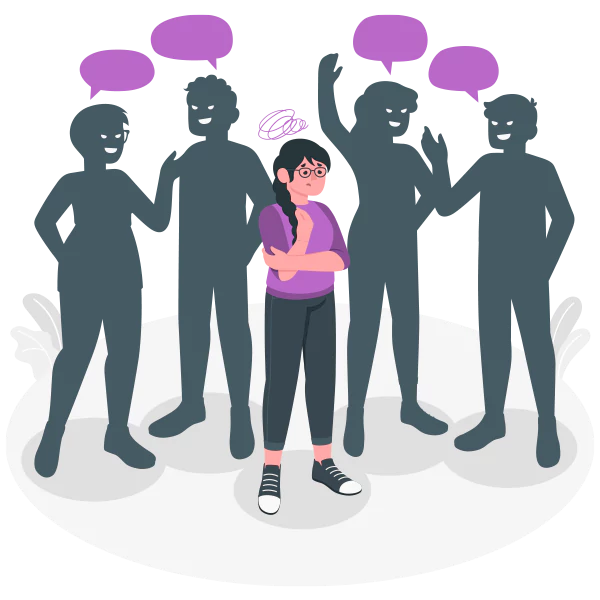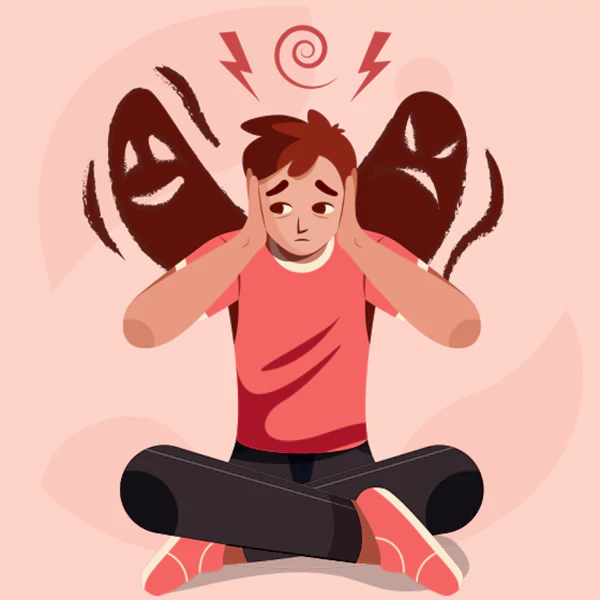Social anxiety disorder, commonly known as social phobia, poses significant challenges for numerous individuals worldwide as they strive to navigate ordinary social interactions. This condition makes it arduous and uncomfortable for those affected to engage in social situations with ease.
Understanding the causes, recognizing the symptoms, and implementing effective coping strategies are essential for managing social anxiety disorder . By addressing these aspects, individuals can find relief and develop the necessary tools to engage in social interactions more comfortably and confidently.

What is Social Anxiety Disorder?
First and foremost, it is crucial to have a comprehensive understanding of social anxiety and its profound impact on individuals. Social anxiety extends beyond mere worry and encompasses an enduring fear that persists over time.
This fear significantly affects a person’s emotional well-being, influencing their ability to navigate various aspects of daily life, including work or school obligations, relationships, and other routine activities. The emotional toll of social anxiety can be substantial and can hinder individuals from fully engaging in and enjoying their daily experiences.

How Can One determine Whether they Are Grappling With Social Anxiety Or Not?
You might be experiencing social anxiety if:
- You constantly worry about everyday activities, such as starting a conversation, talking on the phone, meeting new people, or speaking in public.
- You are overly concerned about engaging in behaviors that you consider embarrassing, such as sweating, blushing, or stumbling over your words.
- You experience intense fear and anxiety in social situations, consistently feeling nervous and uneasy during social interactions.
- You frequently worry about being judged, watched, criticized, or humiliated in social gatherings. You may also feel excessively self-conscious about your appearance, speech, or behavior.
- You have a strong fear of being criticized or negatively evaluated by others, leading you to avoid eye contact or situations where you may receive attention.
- Public speaking engagements evoke significant fear or avoidance due to the anticipation of criticism or negative evaluation.
- Your social anxiety significantly interferes with your personal relationships, academic or professional goals, or overall well-being. This level of impact may suggest a more severe form of social anxiety.
It’s worth noting that many individuals with social anxiety may also experience co-occurring mental health conditions, such as panic disorder, generalized anxiety disorder (GAD), or depression. It’s important to seek professional help if you resonate with these symptoms to receive a proper diagnosis and appropriate support.
What Are the Causes of Social Anxiety Disorder?
The basic stem of social anxiety is a combination of environmental, genetic, and psychological factors. Social anxiety disorder can arise from family history, past experiences, childhood traits, brain chemistry, certain cognitive factors and temperament.
1. Genetics
There is evidence to suggest that genetics play a role in the development of social anxiety disorder. Individuals with a family history of anxiety disorders are more likely to be susceptible to this condition.
2. Brain Chemistry
Imbalances in neurotransmitters, such as serotonin, can contribute to the development of social anxiety disorder. These imbalances affect the way the brain processes and responds to social stimuli, potentially leading to heightened anxiety in social situations.
3. Environmental Factors
Environmental factors can significantly impact the development of social anxiety disorder. Traumatic experiences, neglect, bullying, or childhood abuse can shape an individual’s perception and beliefs about social interactions, leading to heightened anxiety and fear.
4. Cognitive Factors
People with social anxiety disorder often engage in negative self-perception and have a fear of humiliation, embarrassment, or judgment. This negative thinking pattern can exacerbate social anxiety symptoms and contribute to a vicious cycle of avoidance and distress in social situations.
5. Temperament
Individuals with a naturally shy or timid temperament may be more prone to developing social anxiety disorder. They may possess heightened sensitivity to social interactions and a greater fear of negative evaluation, predisposing them to experiencing anxiety in social settings.
It is important to note that these factors interact and influence each other, and the development of social anxiety disorder is likely to be influenced by a combination of these factors rather than a single cause. Understanding these factors can help inform therapeutic approaches and strategies for managing social anxiety disorder effectively.
Effective Coping Strategies for Social Anxiety Disorder
1. Seek Therapy
Cognitive-behavioral therapy (CBT) is an effective treatment for social anxiety disorder. It helps individuals identify and challenge negative thought patterns, develop coping mechanisms, and gradually face social situations. Seeking therapy can provide valuable support and guidance in managing social anxiety.
2. Gradual Exposure
Gradually exposing oneself to feared social situations can be an effective coping strategy. Starting with mildly anxiety-provoking situations and progressively working towards more challenging ones helps build confidence and reduces anxiety. This process, known as systematic desensitization, can be facilitated with the help of a therapist.
3. Relaxation Techniques
Practicing relaxation techniques like deep breathing, yoga, meditation, and muscle relaxation can help calm the body and mind during anxious situations. These techniques can be used before or during social interactions to manage anxiety symptoms effectively.
4. Challenge Negative Thoughts
Negative thoughts and self-critical beliefs contribute to social anxiety. It is important to recognize and challenge these thoughts by questioning their validity and replacing them with more balanced and positive ones. Cognitive restructuring techniques taught in therapy can be useful in this process.
5. Develop Social Skills
Enhancing social skills can boost confidence and reduce social anxiety. Actively practicing active listening, maintaining eye contact, and initiating conversations can help improve social interactions. Joining social groups or participating in activities aligned with one’s interests provides opportunities for skill development and socializing.
6. Self-Care
Taking care of oneself is crucial for managing social anxiety. Engaging in regular exercise, maintaining a healthy diet, getting enough sleep, and avoiding substances like alcohol and caffeine that can exacerbate anxiety symptoms contribute to overall well-being and resilience.
7. Support Network
Building a support network of trusted friends, family members, or support groups can provide understanding, encouragement, and a safe space to share experiences. Having people who can offer support and perspective can make a significant difference in managing social anxiety.
Remember, each person’s journey with social anxiety is unique, and finding the strategies that work best for you may require some exploration. It is important to be patient and kind to yourself as you navigate the process of managing social anxiety.
The Bottom Line
Social anxiety disorder can significantly impact an individual’s daily life and overall well-being. It is a common mental health condition characterized by intense fear and anxiety in social situations. However, there is hope for managing and overcoming social anxiety.
Throughout this blog, we have explored various aspects of social anxiety disorder, including its symptoms, causes, and the impact it can have on individual’s lives.
By implementing coping strategies and seeking appropriate help, individuals with social anxiety can develop the skills and resilience necessary to lead fulfilling and meaningful lives, while managing and minimizing the impact of social anxiety disorder.




